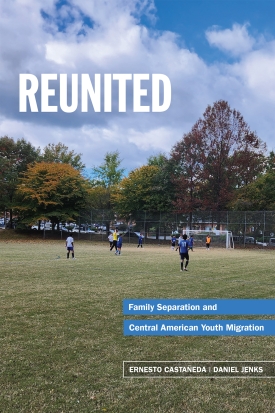
Reunited
About This Book
“Timely, meticulously researched and argued, Reunited deftly weaves the voices of Central American youth migrants into cutting-edge scholarly arguments to produce a compelling account that is inspiring, humane, and powerful. Essential reading for scholars, students, policymakers, and anyone interested in understanding the so-called root causes of Central American migration.”
—CECILIA MENJÍVAR, Dorothy L. Meier Chair in Social Equities and professor of sociology, University of California, Los Angeles
“Reunited captures the full complexity of contemporary Central American migration to the United States, explaining both the structural and historical forces propelling it and the ways in which families are surviving in their midst. This important book humanizes one of the most politically and morally challenging issues of our time.”
—LEAH C. SCHMALZBAUER, Karen and Brian Conway ‘80, P’18 Presidential Teaching Professor of American Studies and Sociology, Amherst College
“Reunited is an essential account of the nefarious effects of inhumane U.S. immigration policy that separates Central American children from their immigrant parents. Ernesto Castañeda and Daniel Jenks offer a nuanced and compelling portrayal of the enduring toll of these separations on child well-being and family ties, as well as the challenges and emotional labor involved in ‘picking up the pieces’ once children migrate to the United States to reunite with their parents, while also suggesting reforms that would aid their integration in U.S. society.”
—CHIARA GALLI, assistant professor, Department of Comparative Human Development, University of Chicago
Over the last dozen years, an increasing number of children from El Salvador, Honduras, and Guatemala began arriving without parents at the U.S.-Mexico border. In many cases, the parents had left for the United States years earlier. In Reunited sociologists Ernesto Castañeda and Daniel Jenks explain the reasons for Central American youth migration, describe the journey, and document how minors experienced separation from their families and their subsequent reunification.
In interviews with migrant youth, their sponsors, and social services practitioners in and around Washington, D.C., Castañeda and Jenks find that these minors migrate on their own for three main reasons: gang violence, lack of educational and economic opportunity, and a longing for family reunification. The authors note that youth who feel comfortable leaving and have feelings of belonging upon arrival integrate quickly and easily while those who experience trauma in their home countries and on their way to the United States face more challenges.
Castañeda and Jenks recount these young migrants’ journey to the U.S. border, detailing the difficulties passing through Mexico, their encounters with U.S. Customs and Border Protection officials, and staying in shelters while their sponsorship, placement, and departure are arranged. The authors also describe the tensions the youth face when they reunite with family members they may view as strangers. Despite their biological, emotional, and financial bonds to these relatives, the youth must learn how to relate to new authority figures and decide whether or how to follow their rules.
The experience of migrating can have a lasting effect on the mental health of young migrants. Although Castañeda and Jenks find that Central American youths’ mental health improves after migrating to the United States, they remain at risk of further problems. They are likely to have lived through traumatizing experiences that inhibit their integration. Difficulty integrating, in turn, creates new stressors that exacerbate PTSD, depression, and anxiety. Consequently, schools and social service organizations are crucial, the authors argue, for enhancing youth migrants’ sense of belonging and their integration into their new communities. Bilingual programs, Spanish-speaking PTA groups, message boards, mentoring of immigrant children, and after-school programs for members of reunited families are all helpful in supporting immigrant youth as they learn English, finish high school, apply to college, and find jobs.
Offering a complex exploration of youth migration and family reunification, Reunited provides a moving account of how young Central American migrants make the journey north and ultimately reintegrate with their families in the United States.
ERNESTO CASTAÑEDA is director of the Center for Latin American and Latino Studies at American University.
DANIEL JENKS is a doctoral student at the University of Pennsylvania.
